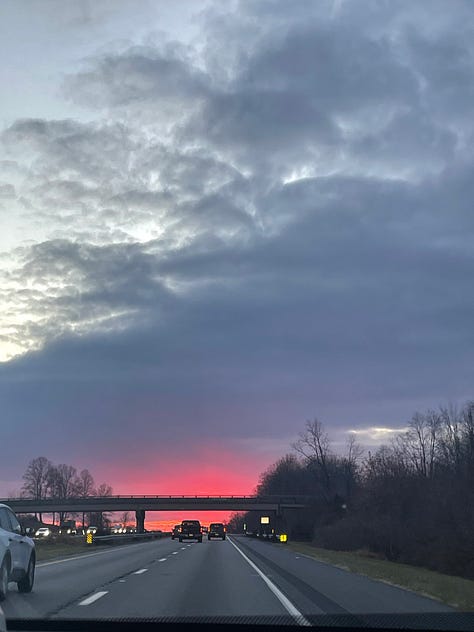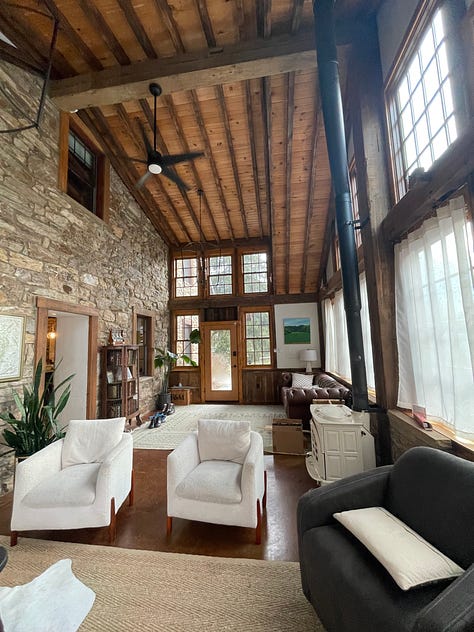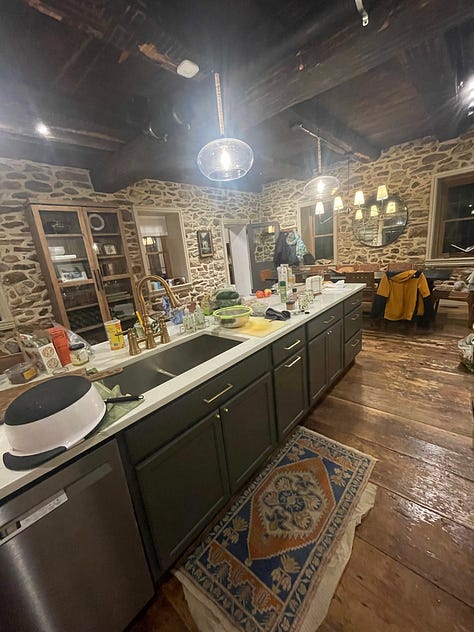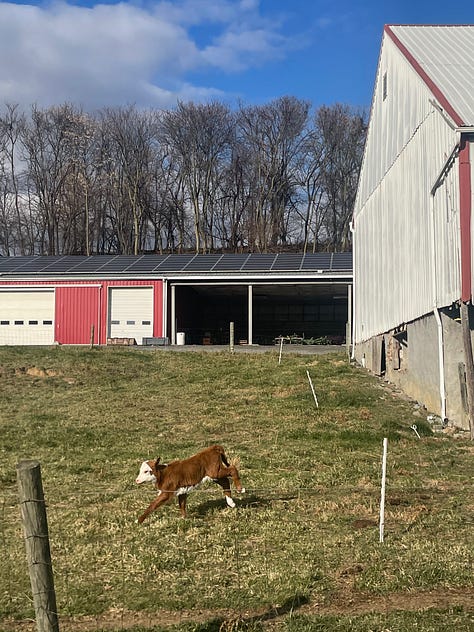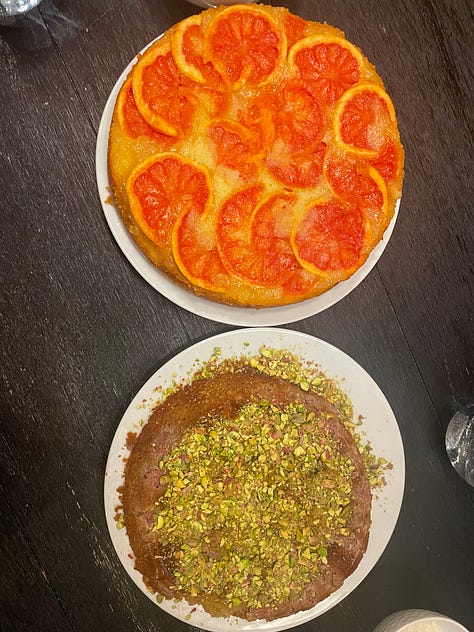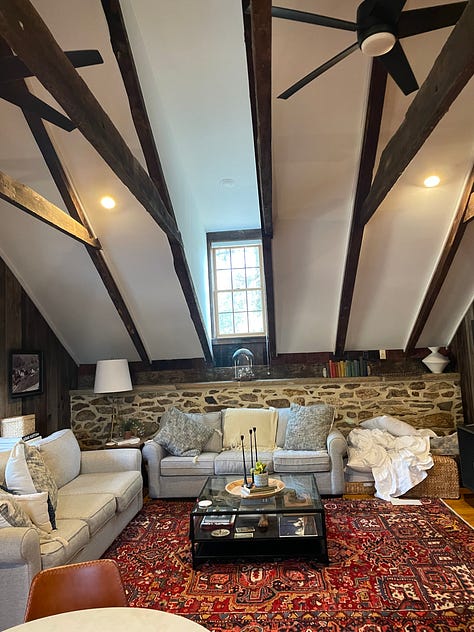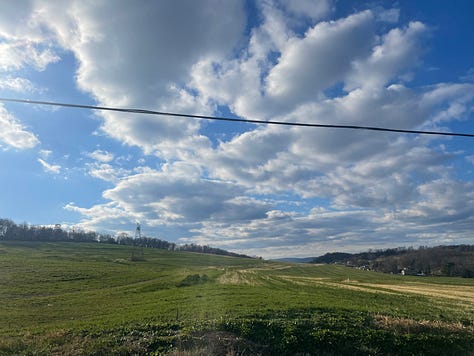Retreating forward
How I learned to stop worrying and love writing again (just kidding, I still worry)
I think that it is tempting, when any major events occur, life-changing ones, to assume you must forever encase in resin the old person you used to be, and carve yourself anew. Too much has happened to simply adapt. You cannot just shed an old skin, to reveal a fresher version of the same underneath. You must transform.
But imagine my surprise when, despite it all, I still feel like myself. I still laugh at the shows that used to make me laugh, I still love to read, I still feel a runner’s high from a slow jog. Enough has changed that I have to get my bearings, but I am still the one who stepped into the new reality that I am in.
I have spent time this year telling myself it is simply not practical to keep writing, especially when I read over the draft of my old project. So far, it has 30,000 meandering words of a novel about female residents of color in medical training, and feel like a different person wrote it. Someone who hadn’t spent nearly 2 months total at bedside in the hospitals she trained at for medical school and residency, praying that her loved ones would survive. Someone who didn’t have to sort through the appointments, the second opinions, the bills, the cancellations and rescheduling the therapies, the insurance submissions, the cognitive load. Why carve out the time to write, when I don’t know where it will go? There are more urgent, specific tasks at hand. There always will be.
There are other reasons, too. Are words false hope, stumbling, in the dark, into accidental falsehoods? A year has gone by since I have written in this newsletter. In that time, my son has had brain surgery, and my husband had a massive kidney bleed. Is it alarming, then, that I wrote at the end of 2023 about being hopeful? Is putting that down on paper utter hubris? That was my last post of 2023. How could I write of hope, of gratitude, when so much had gone wrong?
How well you have handled things, I have been told. Nobly. Practically. Constantly. But it is never the whole story. It is hard to put in writing the ugly side of things, the despair, the tears, the moodiness. The feeling of being unsettled even after the acute events are over, and we are left with the chronic.
And yet as time goes on I realize, as I wrote in my piece published just about a year ago, that I am using the wrong measures for my writing, or more specifically, for the reason to write. For my 4-year-old children, life is less about practicality and more about whimsy. And losing whimsy would be a great blow. The longest week of this year was the week my son didn’t smile, after his brain surgery. Even when the breathing tube was out, the foley catheter was out, the arterial line was out, one IV was out. His favorite song was on. Still, he was despondent in bed, staring off. We begged him to nibble a popsicle. (This is a kid who ate 10 popsicles in a day, once. Biting them, 4 or 5 bites and done, empty stick tossed into the garbage pail, already clamoring for the next one). I’ll never forget his first bite of that first popsicle, how unbelievably relieved I was. I’ll never forget his first true smile after the surgery. Or, that day he got out of his bed and walked on his own for the first time post-op, taking confident steps to grab the goldfish crackers he wanted. I remember his twin sister visiting and the two of sitting on the hospital bed, eating all the hospital snacks I had once eaten at midnight as a resident, like absolutely nothing had happened. His sister making her own “hospital bed” on the pullout couch. The other family on the onco ward, the ones who had been there for far, far longer, coming door to door to give out popsicles on Memorial Day.
One day we forget that his smile is as special as it was that first time. Because he is doing it every day. One day his sister asks again why he doesn’t talk, will he ever learn to talk, and it doesn’t pierce as it once did, because I realize he is so much more than that. Life is about so much more than that. In the process of parenting a child with special needs, I have realized more than ever the inherent value in existing without normalized expectations. The specific joy of freeing someone from fitting a mold. The specific joy of freeing yourself from fitting a mold.
My kids deserve a practical mom but they also deserve a whimsical mom, and a fulfilled mom. And so I return back to me, and wanting to write, but now grappling with how. How do I get myself in the right frame of mind? How do I sit and start? I tend to quit before every pulling up of the Google document, every pulling up of this newsletter draft page. It’s not the right time, it’s not the right place. But I started typing this now in the 50 minutes that my son is in his occupational therapy session. As he jumps on a trampoline and giggles I am sitting near a large poster that states, “You never walk alone,” typing away on this page. Sometimes there are other parents in this waiting room, doing work, chatting about autism, giving each other knowing glances when their child bursts forth at the end of the session and tries to run out the door. Sometimes the waiting room stresses me out. There are conversations where I might learn things from other parents that are useful but also stressful. But then, the waiting room is also filled with something else. Love. Commitment. Hope.
I know why I was able to open this page in as random a place as my son’s therapy waiting room, and now revisit it in a coffee shop another day. Earlier this month, I had the good fortune of going on a writing retreat that allowed me to jumpstart my writing. It was a retreat for general pediatricians, led by a pediatric hospitalist named Dr. Chris Bonafide. He has organized multiple of these writing retreats, and this was the first I had attended. It was two nights in a picturesque airbnb in Lancaster, PA. I was grateful for my husband and in-laws taking care of the kids while I was away for three days. The other doctors attending the retreat, some also parents, were working on writing related to their academic research. They are addressing important subjects such as diagnostic decision-making and health equity. They had specific plans and goals, and target journals to submit to. This environment of fellow doctors who were working on their own writing goals, even if the goals were different than my own, allowed me to settle back into my writing chair. Their sense of purpose inspired my own. I sat down to write, and I actually wrote.
I worked on my novel. It’s now a second novel idea, as I have still shelved the first, with the goal of revisiting it when I have more distance. My goal was just to get words out, no matter how bad. Push towards more of the first draft complete. Because I’m an odd bird, I took notes at the end of each writing chunk of how many words I had written.
Day 1: 2 hours
11:15am-12:15pm - 1087 words
1:45pm- 2:45pm - 1236 words
Day 2: 4.5 hours
9:25am-10:25am -1333 words (not newly - edited/adapted something I wrote for something else)
11am-12pm - 1297 words
2:15pm-3:15pm - 499 words
3:30pm - 5pm - 942 words
Day 3: 1 hour
9am-10am - 867 words
Total: 7,261 words in 7.5 hours
It was not just the time carved out that helped me to write, it was the change of place. Next to the fireplace my multitalented friends were able to get going, I found myself thinking not of all the things I had to do—emails I had to respond to (I am very bad at emails), calls I had to make, things to clean, toys to cull—and thinking instead, what would this character do next? How do I build this scene? How does this push forward the plot? And because the whole point of the retreat was to write, write I did.
On day two, the self-doubt started to creep in, and you can see my output correspondingly decrease. They say not to edit as you are writing—go back and edit after. (Who says this, I admit I don’t know). When I noted I was self-censoring with each sentence, I had to pause and grab something from my previous writing project, edit it, and incorporate in this project. I did this to distract myself with an even more concrete task, instead of dwelling on feeling like a fraud. Still, by the end of the day, I felt awash with this sensation of shame that I was not a good writer. It was almost as if the more I wrote, the more I was dragged deeper down, and writing became a sort of defiance, an assertion of my ego even if it was at odds with how I felt.
What helped with all that, and which was the other amazing part of this writing retreat, was being surrounded by encouraging and excited community. As soon as I described what I was working on, someone asked me to alert them when it was available for pre-order. In the afternoons we went on walks and at mealtimes we cooked for each other, and talked about everything—from writing to clinical work to Wicked. Dr. Bonafide facilitated icebreakers and wonderful moments of connection and mutual inspiration within the group. We rotated cooking responsibilities, and I learned some new recipes for delicious easy meals (and cakes!).
And so, at the height of when I was asking myself—what am I doing anyway? why am I writing?—this community reminded me that actually, it makes perfect sense for me to keep on keeping on. More writing. More whimsy.
